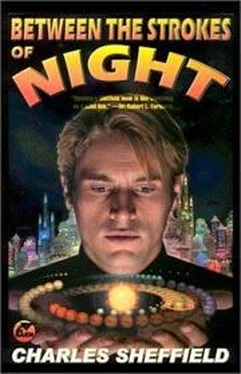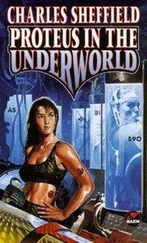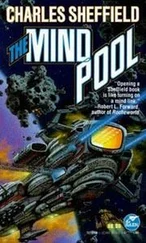“But you’ve been there?”
Emil shook his head. “No, I never have. But your mother has. In fact, she was born on Earth.”
“Can I go there, Dad?”
“I don’t see why not.”
Charlene said, “But not tonight. Tonight you have to go inside, and take a bath right now.”
“Mum, that’s not fair. Dad was explaining things to me. About the stars, and where people live, and what they do.”
“That’s very good. But all that will still be there tomorrow. Go on.” Charlene spoke firmly. “In right now, the water will be just right.”
“What about you?”
“We’ll be in in just a second. Don’t worry, from the look of you there’ll be plenty of dirt left for me to worry about when I’m inside.”
“It’s not fair.” But seven-year-old Damon picked up the little crab-apply fruit he had pulled earlier and stomped off into the house.
Charlene sat down in his place, and Emil said, “He wants to go. To the stars. I suppose that it’s inevitable.”
“I know. The more he learns about where we came from, the more he wants to see it all for himself. Sylvia will be the same. But it won’t be for a long time.” Charlene repeated, with great emphasis, “A long time.”
“We like to think so. But time is flying by. Do you wish you hadn’t come, and you had stayed in S-space?”
“Never! This is real human life, the way we were meant to live.”
“I agree, but the children may not.”
“Emil, that’s an awful thought.”
“But a true one. You can almost bet on it. Our children will be like kids everywhere in space and time, whatever their parents did is by definition stupid and old-fashioned. And maybe they are right.” Emil stared up at the sky, where a thousand stars shone clearly now through the frosty air. Charlene was snug in her thermal wrapper, but Emil should have been chilled. He didn’t admit it, of course. As usual he seemed impervious to heat or cold or any physical discomfort.
“We are all over the sky,” he went on. “It makes you wonder what we are looking for. My guess is that we are all — including the free-space disembodied aliens — seeking the same thing. We want immortality. Either we look for it in person, or through our children, or through works that will live on through time.
“You know, when I was no more than eleven or twelve years old, I was convinced that it was human destiny to spread wider and wider in space, until one day there would be humans, or the changed descendants of humans, everywhere. But what I never imagined, even in my wildest dreams, was S-space and T-state and cold sleep, and all the other possible ways of changing the rate at which we live. The human diaspora is real, but it is more than I could conceive. It is taking place through time, as well as through space. We, or our children, are going to be present in the farthest depths of space and time. And we won’t just be there. We’ll dance and sing there, even if the singing is done with radio frequency electromagnetic signals, and the dance is a swirl of free electrons.” While he had been speaking, Charlene had sat silent at his side. He turned to her.
“Well, I guess your notable lack of response is sufficient comment on my ramblings. Or were you miles away, with thoughts of your own?”
“No. I was listening.”
That was almost true. Charlene had been aware of every word that Emil said. But as soon as he had spoken of children and immortality, her thoughts had set off on their own flight. Long before them, Wolfgang Gibbs had chosen a Mayfly life on one of the planets and rejected any attempt at personal immortality. What was the name of the place? Kallen’s World.
Wolfgang was dead now, his life had finished uncounted centuries in the past. Nothing of his mortal remains would survive. They had crumbled to atoms, just as the body of Judith Niles, which Charlene had insisted that they bring with them to Leemu, was crumbling now to quiet dust in the chilly ground of their new world. But Wolfgang’s descendants surely lived on, as presumably JN herself lived on in noncorporeal form. Some day, in a far-off time and place, maybe Charlene’s descendants and Wolfgang’s would meet. They would, of course, know nothing of the long-ago affair of their great-to-the-Nth grandparents. And that was just as it should be. Each generation should make its own loves, establish its own bonds, and know love and life and exultation as if they were newborn that very hour.
She thought of Wolfgang, but it was not with any sense of regret. Fondness, yes, and more than that, an odd curiosity. Of course, she would never exchange Emil, Damon, and Sylvia for anyone or anything in the known — or unknown — universe. But the curiosity took the form of an unanswerable question: would their children’s children’s children, someday and somewhere, meet?
It was not a subject she would ever discuss with Emil. He had little or no jealousy in him, but there were some things that you simply did not mention to your lover, husband, and life-companion, no matter what the circumstances. Charlene reached forward and placed her hand on Emil’s head. As she suspected, it was cold, much too cold to be comfortable.
“Come on, love,” she said. She felt an infinite affection and gratitude for the man next to her. S-state permitted no such intense feelings, nor would it ever. “Come on,” she repeated. “We need to get inside before you freeze. And if you want to see your son do his best to flood the whole house with bath water, we’ll have to hurry.”
And then, inexplicably — stupidly — she added, “They’ll meet as strangers, of course. And that’s just as it should be.”
Emil asked, not surprisingly, “Strangers? Who are you talking about?” “The children. If they leave here for the stars, they won’t know anybody.” “Of course they won’t — for the first week or two. But they’re young. They’ll make their own friends soon enough. We did it, didn’t we? And if we did it, then anyone can.”
Emil linked his arm in hers and led the way back into the house. Even from a distance, Charlene could hear the sounds of a child’s laughter and splashing water.
The beginning of time
I evaluate my chances of personal survival beyond the next few minutes as zero. Also, I will never achieve my original goal of following time all the way to its end. In a universe of infinite expansion, that is of necessity impossible. However, I am not disappointed. What I am doing is far more interesting. This group of Kermel Objects, baffling to me as to their basic nature and goals, has over the past four thousand T-state years (eight billion years, in old time measure), significantly altered its behavior patterns. The Kermel Objects used to be loners, sitting far removed from each other in interstellar — more accurately, inter-galactic — space. Now some of them are clustering, forming a tight little group within which I have carefully sited myself at the exact center of mass. More Kermel Objects join us, and as they do the local matter-energy density steadily rises. As it does so, local spacetime curvature increases.
It is not difficult to project an end point, or to conjecture what is happening here. The Kermel Objects are breeding; however, unlike all other forms of life (and intelligence?) they propagate in a unique way. Massless themselves, they somehow increase the local matter density until spacetime curvature exceeds a critical mass. At that point, the cluster of Kermel Objects will pinch off from the rest of the universe. They will create, in fact, a new (and empty?) universe in which they can multiply and prosper.
And now for the big question: what would happen to a human who remained at the center of the cluster, as the curvature rose and rose to its critical value? Would the human survive and be “carried through,” to emerge in that new time and space created by the Kermel Objects?
Читать дальше












